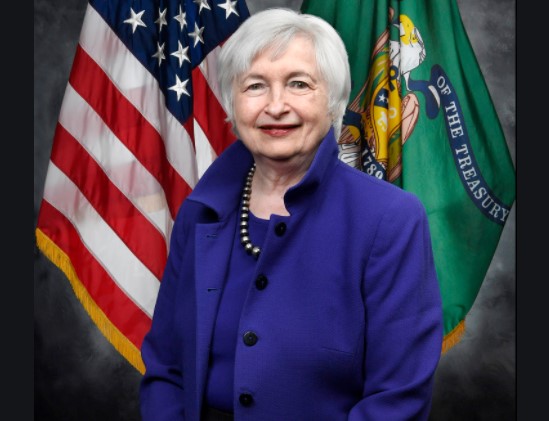After EU tax win, Yellen will try to sell U.S. Republicans on global tax deal
Janet Yellen's first visit to continental Europe as Treasury Secretary helped solidify G20 political support for a global corporate tax deal and gave European Union officials an excuse to delay a problematic digital tax proposal. Returning from Brussels, where Yellen met EU officials on Monday and Tuesday following a G20 meeting in Italy over the weekend, Yellen faces a battle in the U.S. Congress over the Biden administration's tax-hike plans that include the 15%-plus global corporate minimum levy agreed by 132 countries.

- Country:
- United States
Janet Yellen's first visit to continental Europe as Treasury Secretary helped solidify G20 political support for a global corporate tax deal and gave European Union officials an excuse to delay a problematic digital tax proposal.
Returning from Brussels, where Yellen met EU officials on Monday and Tuesday following a G20 meeting in Italy over the weekend, Yellen faces a battle in the U.S. Congress over the Biden administration's tax-hike plans that include the 15%-plus global corporate minimum levy agreed by 132 countries. In an interview with Reuters, Yellen said she plans to increase her outreach to members of Congress from both parties as she works with leaders of House and Senate tax-writing committees to craft legislation under budget "reconciliation" rules to implement the OECD "Pillar 2" corporate minimum tax.
Democrats are widely expected to try to use these rules to push through without Republican support President Joe Biden's plans to raise taxes on corporations and wealthy Americans to help fund spending on infrastructure, child care, and other social priorities. Several top Republican lawmakers have denounced the OECD deal as a "surrender" of the U.S. revenue base and vow to oppose any reversal of their 2017 tax cuts.
"I’m not in agreement with the Republicans, but I think it's important for me to explain to them what the logic of this agreement is and why I see it as in the U.S. interest," Yellen said. "I remain hopeful that they can be supportive of parts of it. I feel it's my obligation to work with both sides of the aisle."
Treasury officials say they are angling for bipartisan support for the more complicated "Pillar 1" reallocation of taxing rights for large, highly profitable firms, which will require a new international agreement to allow taxation in countries where they sell products and services. Yellen said on Sunday that this part of the deal won't likely be ready for Congress' consideration until at least the spring of 2022.
NEGOTIATING SPRINT Yellen joined other G20 finance leaders in Venice, Italy, to endorse the OECD tax deal, under which signatories also agreed to drop national digital services taxes in favor of the new taxing rights.
The move launches 15 weeks of furious negotiations to try to land a detailed agreement by an Oct. 28-29 G20 leaders summit in Rome. The main issues still to be decided include; the actual global minimum rate, the percentage of multinationals' profits above a 10% margin that market countries can tax, the size threshold for those companies, subsidy carve-outs, and potential exclusions for certain sectors, such as financial services or mining.
Rebecca Christie, a non-resident fellow at the Brussels-based Bruegel economic think tank, said Yellen's first in-person meetings with top EU officials helped soothe transatlantic relations strained by four years of "America First" policies under former U.S. President Donald Trump. "Yellen's task now is to get Congress on board with the tax deal. The U.S. decision to commit to the global minimum tax was essential to reviving the OECD talks," Christie said. "Likewise, U.S. implementation will be essential to getting other signatories to follow through on their commitment."
ARRIVAL GIFT As Yellen met with European Commission President Ursula von der Leyen for the first time on Monday, the EU's executive body announced that it would delay a proposal for a new digital levy, eliminating a complication for the talks.
That proposal to help fund COVID-19 relief was conceived last year when global tax negotiations were stalled and several countries moved ahead with their own digital services taxes. Yellen said because countries had agreed to refrain from new digital taxes, it was better for the EU to wait until the parameters of the tax deal before recrafting the plans. Yellen is pushing for a higher global corporate minimum tax rate than 15% and wants Congress to double the U.S. overseas minimum to 21%.
"Different countries have different perspectives on this obviously and the work over the next several months is to try to see where we can find common ground," Yellen told Reuters. "But look, it's a big deal to find common ground, that everyone agrees on at least 15%." Yellen said that she believed EU holdouts to the tax deal Ireland, Estonia, and Hungary want "to find a way to get to yes."
(This story has not been edited by Devdiscourse staff and is auto-generated from a syndicated feed.)
ALSO READ
EXCLUSIVE-Biden, Kishida likely to discuss Texas bullet train project, sources say
US Domestic News Roundup: Biden, Kishida likely to discuss Texas bullet train project, sources say; US Justice Dept rebuffs Republican demand for audio of Biden interview and more
Paul Simon to play for Japan's Kishida, Bidens at White House state dinner
HHS Secretary Becerra may leave Biden Cabinet to run for California governor, Politico reports
Biden and Japanese PM unite for stronger alliance during White House visit










